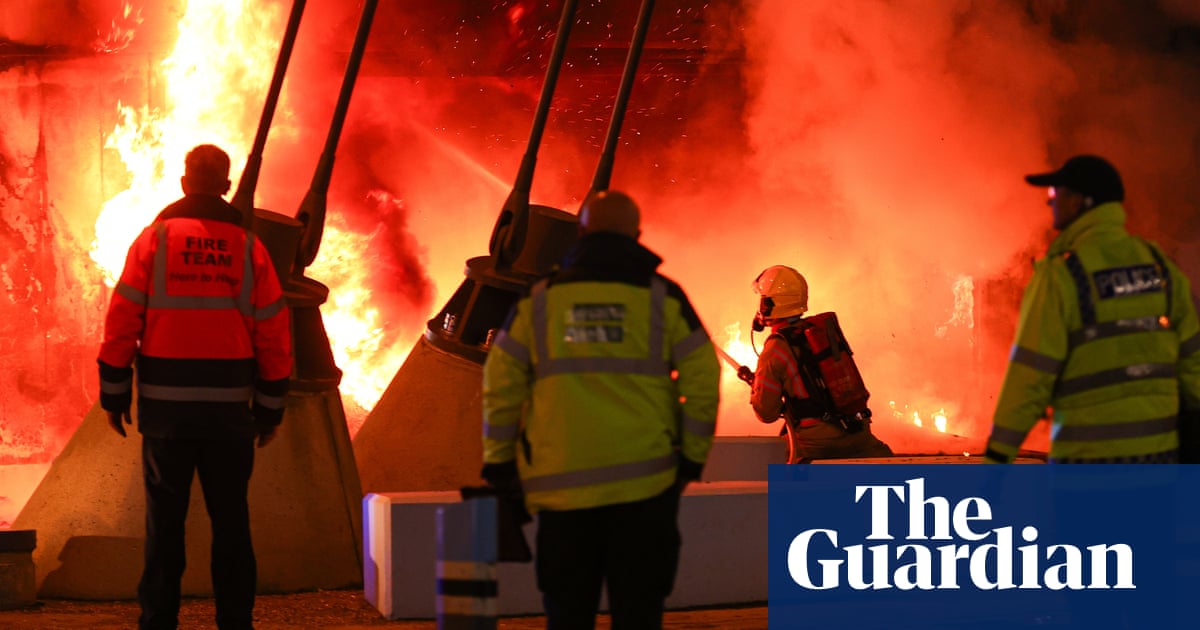Fire stations inEnglandare “falling apart”, fire chiefs have warned, with funding plummeting by an estimated £1bn in the last decade as callouts have increased by a fifth.
Fire and rescue must not become the “forgotten emergency service”, the National Fire Chiefs Council (NFCC) urged, warning of mounting pressures that “risk undermining public and firefighter safety”, as it responds to more 999 calls with fewer firefighters.
The call comes before the government’sspending reviewnext week, in which the chancellor, Rachel Reeves, has promised to support the NHS and increase defence budgets.
Fire services have not been mentioned, leading to concern that they will be forgotten, according to the NFCC, which represents the heads of fire services across the UK.
Firefighter numbers in England have dropped by a quarter in seven years, the equivalent of 11,000 full-time staff, according to the government’s workforce statistics.
There has also been an estimated £1bn shortfall in capital funding since the previous government removed a significant grant in 2014-15, which the NFCC said meant services could not maintain or modernise ageing infrastructure, including fire stations.
Failing to reverse this damage could endanger the public and firefighters, said Phil Garrigan, the NFCC chair.
The inquest intothe deaths of two firefighters and a member of the public in a blaze in Oxfordshireopened on Tuesday. The firefighters, Jennie Logan, 30, and Martyn Sadler, 38, are thought to have died when a structure collapsed on them at a Bicester business park during a large fire on 15 May. Two other firefighters are still in hospital.
The financial challenges are being tackled at the same time as demand for fire and rescue services in England is growing. Government figures show officers responded to 600,185 incidents in the year up to December 2024, a 20% increase compared with a decade ago.
While the number of fires has fallen by 11%, non-fire callouts have increased by 65%, data from the Ministry of Housing, Communities and Local Government (MHCLG) shows.
In 2022, the services dealt with a record number of wildfires but 2025 appears likely to beat that, with 225 wildfires tackled so far, compared with 106 over the same period in 2022.
Garrigan said: “These figures are unequivocal: fire and rescue services are busier now than they were 10 years ago, and we are taking on more responsibility, not less. The risks faced are now more challenging and more complex. Despite this fact, we are seeing firefighter numbers falling, whereas all other public services are seeing their numbers return to pre-austerity levels.”
He said firefighters’ work was “crucial in maintaining public safety and we welcome the opportunity to make a real difference but, if it is to be sustained against a backdrop of increasing demand, we need to see investment back into the fire and rescue service”.
He added: “If we leave fire and rescue services without proper financial support and investment, we risk undermining public and firefighter safety. When it comes to wildfires, flooding and terrorism, fire and rescue services are right at the heart of the response. If we fail to invest, then we need to be prepared to answer to the communities that rely on these services in their greatest time of need.”
Earlier this year, the NFCC called on ministers totake urgent actionto protect communities from the effects of climate breakdown, saying the UK was not prepared.
The organisation said fire services’ ability to tackle weather-related emergencies was at risk, despite them often being the main frontline response to major weather events including flooding, fires caused by heatwaves, and storm-related emergencies, all of which are becoming more frequent.
An MHCLG spokesperson said: “We understand the challenges that fire services are facing, and despite the inheritance this government has been left with, we are determined to deliver better public services through our plan for change.
“Fire and rescue authorities have received almost £3bn in the last financial year to support our brave firefighters and help them protect our communities.”
